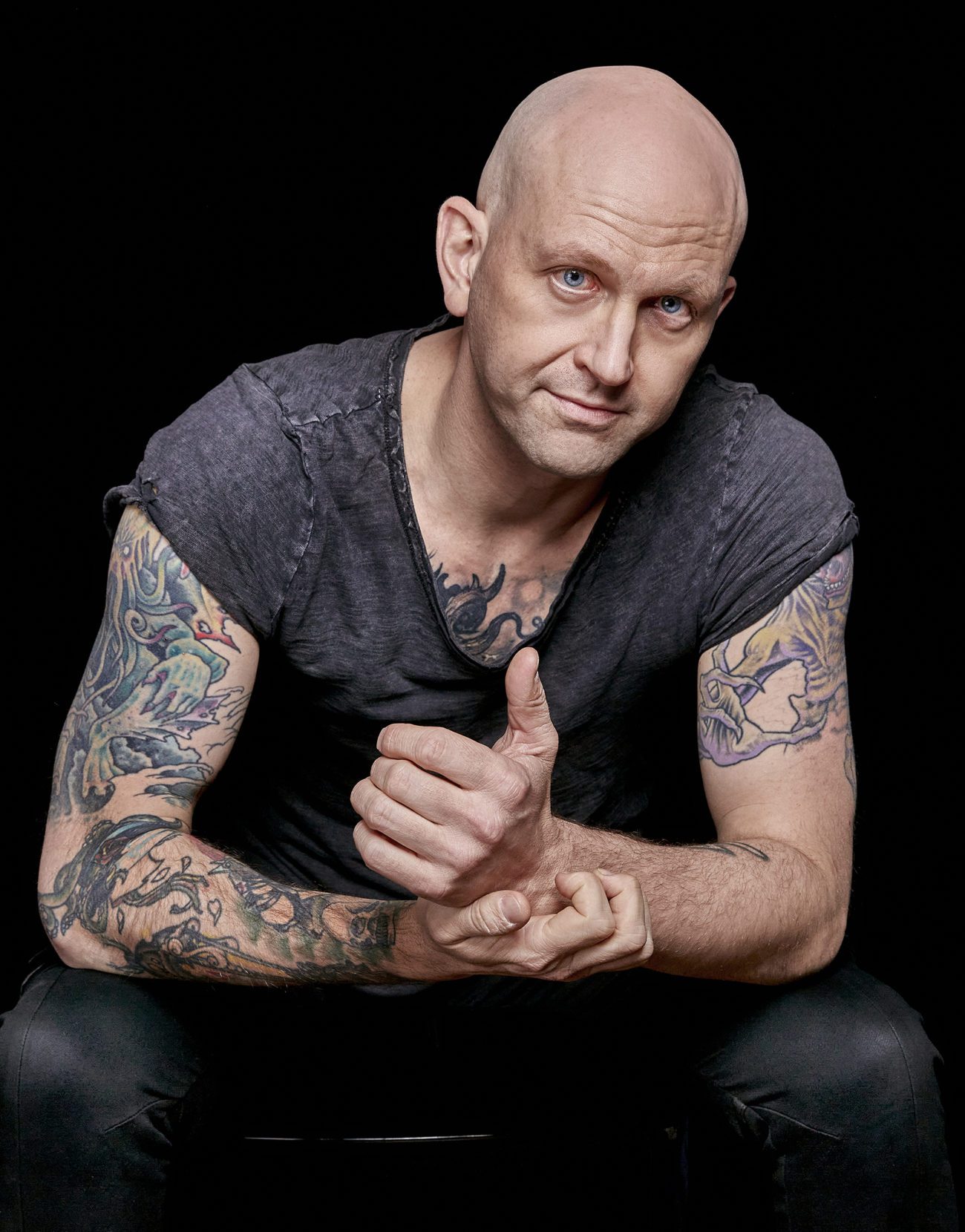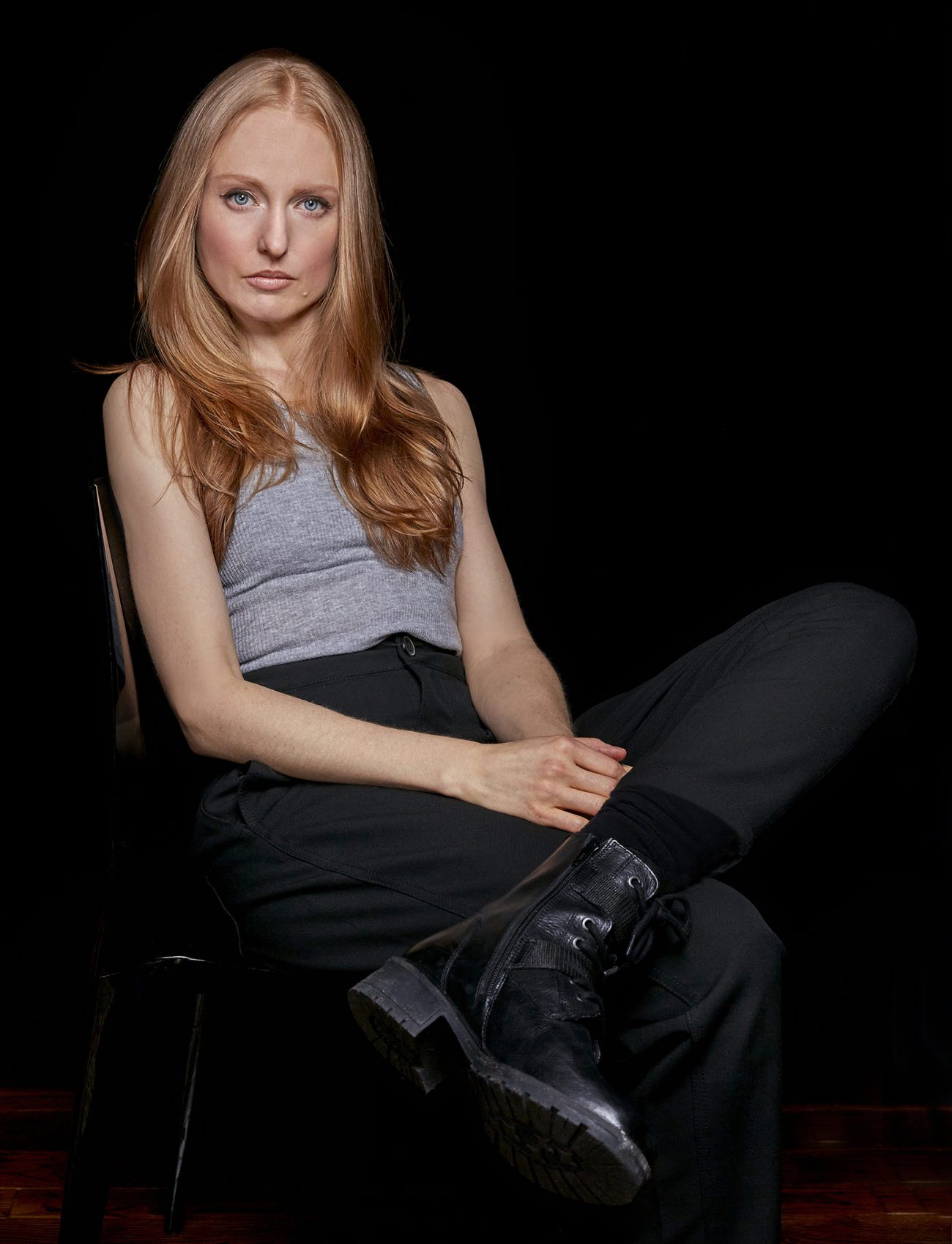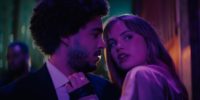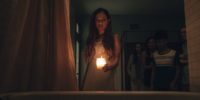Alone with You is a claustrophobic and at times quite dizzying psychological thriller from the minds of screenwriting duo Emily Bennett and Justin Brooks. Their UK premiere will be screened at Grimmfest next month, and I had the opportunity to talk with them both recently in anticipation of that.
After a brief introduction, I asked how their writing partnership works. “It’s funny, I’ve been talking about this a lot recently,” said Justin. “It’s strangely seamless. Emily and I have very, very similar interests in the films we want to make, and our voices as filmmakers; so most of the time, it’s her and I in a room bouncing ideas back and forth, with a whole lot of ‘Yeah, that’s exactly what I was thinking.’ So we work really well with one another, with a singular vision, but it also helps that both of us have come into films from opposite directions.”
“Completely opposite,” agreed Emily. “Different upbringings, different genres when growing up. When you look at us, we look really different: Justin’s cool with tattoos and a badass look, he used to tour with punk bands. I grew up in the south, in the Bible belt, became an actor, trained in the UK, and I was like a ‘good girl’ with no tattoos. And when we met, oddly enough, it just worked. We bounce ideas but, with our different backgrounds, we end up with stuff on the table that would never have existed in just us as individuals.”
“The films we make together are definitely films that we wouldn’t make on our own,” said Justin. “We have our own voices as separate filmmakers, but they are unlike the things we make together. I think that’s because Emily comes from an actor background, and I come from a technical and visual background. I think very much from the world, and Emily from the character, so we really just marry in what I think is strong storytelling. I love being able to work with Emily.”
More than being a ‘quarantine film,’ we wanted to give that haunting feeling of what we all went through without referencing the pandemic.
–Justin Brooks
“I think we’ve become quite an interesting writer-director mutant when combined,” added Emily. “We’ve become something pretty special, and it’s endlessly fun and entertaining working with Justin.”
It’s funny: I reckon about a quarter of the films I’ve covered in the last year have come from writing partnerships. I recalled my interview with Julien Maury in which he said he and Alexandre Bustillo were “two persons but one brain.”
“We’re two people with one brain, too,” agreed Emily, “when it comes to the stories we create together. But as people, we’re very different, but the opposites work. Justin is a genius with visuals, a studied cinematographer, and he was a musician for years—went to the Conservatory for guitar. It’s all very intimidating as an actor. I mean I can do a monologue (I know I’m selling myself short), but he’s studied in a technical realm and has kept me on my toes.”
Pulling more than her weight in the partnership, Emily is the key presence in Alone with You. She has carried on with other roles too since starting to make her own films, and I asked whether she wouldn’t prefer to just do her own thing. “I like handing over the control, honestly,” she replied. “I’ll always be an actor. I think it makes me a better storyteller, a better writer, director. And I will say, after co-directing Alone with You with Justin and starring in it, I look forward to not doing that in the next one. I will be in our films in one way or another, cameos here and there. This one was a beautiful journey in and of itself, very method, but I do love acting in other people’s work: it takes the pressure off me. I used to think this is so hard, I have to get better! And then I got into filmmaking and realised that was just a piece of it, so acting in other people’s films is a joy.”
“Emily and I are in the same mind in that we will both always direct together and separately,” said Justin. “I came into this as a cinematographer, so I’ll always want to focus on that angle. I have no plans to stop shooting other people’s works because I love being able to focus on that one single craft; as a director, you’re kind of the whole orchestra, wearing many hats. For Emily’s acting and my cinematography, we get to hone in on one craft, which [are] our real strengths and what we’re still most interested in.”
As for the film Alone with You, I had to ask where the idea came from. I hear about writers recommending to “write what you know,” but I hoped this one didn’t come from experience. Emily gave me some background: “Quarantine started, we shot two short films, and that gave us the confidence to say ‘Hey, let’s do a feature.’ Ideas need some time to incubate, and we didn’t want to start from scratch, so we would walk in a graveyard (there were no public parks open in Brooklyn, so that’s where we walked every day) and talk about what short film scripts we had that could be stretched, that could be expanded upon. We landed on an idea that Justin had called ‘a closed door,’ and it is this story starring a male character; and as I’m the only actor in the house, it had to be a woman.”

“For some reason, I always write female-led films,” added Justin, “perhaps because I was raised by a very strong mother, a military Mom. Women in my films tend to be my heroes. As Emily tends to be my star every time, I made it a point that this time I was going to write for her friend, a man…and that immediately turned back on itself when we decided to make it into a feature.”
“I think for the better, though,” said Emily, “because, honestly, if you look at the film, the only voices that are heard, the only characters with any lines, are all women. There are no male voices, even in the soundtrack: it’s an entirely female film.”
Alone with You, like several other films I’ve seen over the last year, deals with the breakdown of a relationship; both that topic and grief seem to be prevalent right now. I asked Justin and Emily if they had any theories about why that might be. “I think, personally, this film comes almost from a grieving of self, a loss of identity,” said Justin. “It’s the loss of oneself and the relationship you have with who you are. I think any of us that have gotten deeply involved in relationships find that we lose ourselves a little in those relationships, and that’s really what I wanted to talk about in the beginning. Then, as Emily and I worked on the story together, it blossomed into this beautiful but haunting and heartbreaking story of the loss of oneself and loss of the other, and I think a lot of that reflects this period we’re in—at least now, coming out of the pandemic. I heard a lot of people in quarantine not being able to recognise themselves, not being able to go out and be part of something. It was hard to understand who they were anymore. This was how we wanted to model the film: more than being a ‘quarantine film,’ we wanted to give that haunting feeling of what we all went through without referencing the pandemic.”
“I think we all did grieve a little when we had to go into quarantine,” continued Emily. “I know the UK went through a similar experience. Not seeing your family, people you define yourselves by—especially that most important relationship to Charlie in the film, Simone—it was our way of grieving and writing about identity, self and self based on relationships. When that breaks apart, who are you? I think that’s something that will resound, and I’m really glad we made the decision not to make the film about COVID because approaching it this way makes it more evergreen and a bit more universal, I think.”
I certainly felt that the mood in the film reflected the isolation that was going on in the world as a whole, but the setting in time wasn’t mentioned at all. “That was very purposeful,” said Justin. “I feel like it’s a story that’s going to be told, and I know there are a lot of filmmakers—were even then—already telling that story, and I think we had a different story to tell. We wanted to find our own voice in this, and find the story that we wanted to tell. One of the most wonderful things about Emily and my partnership is that she brings a deep understanding of the character. When we talk about it, we’re just talking about people we’ve made up. The people get built first, and then the story wraps around them.”
I asked what it had been like to direct a film with only one person there on the screen for most of the time. “It was really, really difficult,” said Justin (which made Emily laugh). “A lot of people don’t realize, but the only two people on the set were Emily and [me]. The exception was that my father came and made us dinner. There was no crew, so when we’re running sound; it’s hooked up to whatever I could put a clamp on. Any sort of move was us figuring things out together. One of the more difficult things was trying to still be directors while also being attentive to character and story, and what the character was going through…while also being technicians and being grunts, moving things from upstairs to downstairs. It’s tough going from one brain to another. Emily had to go from directing and producing with me, always blocking and creating together, then slip into this intensely emotional character. It always blew me away. She did an amazing job.”
“Thank you!” said Emily. “I think we both wore so many hats, two in particular. We took the position of looking at the film globally as directors, looking down on the entire story, storyboard as much as [we] had time for, almost editing in advance, and then going to work. I’d help with putting lights up and so on, but I’m no techie. I love my crew, and I missed them. I’d help him, I’d be the AD, do my hair and make-up but then felt schizophrenic—it was crazy! We’d have to map out shots and walkthrough, then I’d say ‘give me a minute’ so I could be ready and do it. I had a whole playlist, mostly love songs to Simone, to get me into the right head, touchstones for me (or Charlie). And my brain felt like it was breaking. I was a very objective director then stepped into insanity. After a while, that helped: it was like a muscle. Every time I had to step away and then step back in, after forty-five days of doing this, it got quicker. We shot it pretty much in the order it was in the film, but by the end, I felt like I was going insane. I felt much like Charlie. That process did a lot of the acting work for me, certainly helped me.”

Considering Emily’s was the only face on the screen for most of the time, I asked how that felt. Was it a vulnerable position, or did she get an extra sense of autonomy, for example? “It’s just terrifying,” she said. “I couldn’t really think about it. I truly had to surround myself with the other characters, at all times, in my head. Charlie defines herself by her relationships, by the people in her life, so honestly playing Charlie was a lot less lonely than I could have expected. Having said that, I acted to green screens. I never had a scene partner ever unless I was with Emma Myles on set, which was very rare. I couldn’t approach this like I was the lead of this film: I am Charlie, and as Charlie, I have a very difficult relationship with my mother, a very playful relationship with my best friend Thea, who is constantly trying to get me to go out to the bar; I have this loving but troubled relationship with Simone, and each thing I do in the apartment (the record, the flowers, and so on) is all for her. So I never felt lonely as a character, if that makes any sense. But I think that’s part of Charlie’s denial and what she has to come to terms with. So I had to approach it from there: if I approached it as the lead of the film, it would have been God awful. Character, character!”
I changed the subject somewhat here and told my guests—unloaded to them, really—about how much the second half of the film had messed with my head. (“Good!” said Justin.) There were many elements or images which were either real or surreal, and I wanted to understand whether I was making too much of this. “There is an intent behind everything in the film,” said Justin. “Nothing is there simply for style. Everything has a piece of the story and, speaking in non-spoilers, I can tell you that everything in the ending has a piece of Charlie and what she has gone through. Emily and I come from film backgrounds where we are both interested in metaphor and symbolism; we’re fans of late ’70s horror. I’m an enormous fan of Jodorowsky and his ideas behind symbolism, so that kind of creeps into the film.” We talked some more about how it can be difficult to know whether to trust what we see of this central character, but I’m going to let you find out all about that by watching.
Moving away from the surreal to the mischievous, I brought up the subject of the fabulously smiley Barbara Crampton, who has a cameo in Alone with You as Charlie’s mother. I asked whether there is any other iconic actor they dream of working with. “Too many,” said Justin, so I asked for one each. “I come from a traditional horror background, growing up with ’80s slashers, and Emily comes to horror from a different place, with an appreciation of Bergman and ‘deep’ horror. I’m the guy who can pull out all the slashers, and she’s into art films. I have always loved watching Robert England. I think he’s such an interesting character on his own, and I’ve seen him do some fun stuff in his film; I’d love to work with him.”
“I just recalled one,” said Emily. “I wrote a role for kind of an iconic Lynch and horror actor, Carel Struycken. He played Lurch in The Addams Family, the seven-foot-tall man who appears in Twin Peaks, the most beautiful face. I think he’s actually in his seventies now. I spoke with him a while ago because I wrote a role for him in a film called She Came Back. Justin and I will work on that in a while, but he has to play it. I wrote it for him. I found his website and reached out to him, and he’s the loveliest man. Once financing comes in, hopefully, it will happen: he’s my guy.” Two great answers.
So apart from She Came Back, what else is on the cards next? “For both of us,” Emily said, “honestly, we were supposed to be shooting something completely different last year, but then COVID. I’m honestly grateful that I managed to act in such a prominent part in our first dual director feature, but it looks like in 2022 we’ll be moving towards production for another feature called Kept. It’s the first script that Justin and I have written together with the same production team, and it’s a gothic horror story set in the modern-day, very much based upon relationships. That’s where the true haunting lies. I’m in love with the characters we’ve created, and this time I’m not going to star.”
Plenty to look forward to! US distribution of Alone with You has been acquired by Dark Star Pictures for early 2022. In the meantime, the UK premiere will take place on 7 October at Grimmfest in Manchester.


